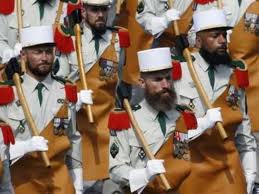Mahlerman is supplementing my belated musical education, dispensed via his remarkable Lazy Sunday Afternoon posts, by slipping in the odd piece on cinema. Last Sunday he included the opening scenes from the 1999 French film, Beau Travail. There’s plenty here to pique one’s interest – the theme of male jealousy, the use of Britten’s Billy Budd, the striking desert setting. But what provides a strong hook, for me at least, is that its subject is a group of French Foreign Legionnaires in Djibouti.
The French Foreign Legion has fascinated me since I was a boy (despite, or perhaps because of, the introduction coming through Beau Hunks, the Stan and Ollie version of Beau Geste). I imagine quite a few boys – and girls? – of all ages share this fascination. As Byron Rogers puts it in his autobiography, Me: the Legion ‘sells newspapers’.
I’ve just finished reading Me, having come to it through Rogers’ fine biography of RS Thomas. Rogers’ specialism as a journalist is the collection, polishing and retailing of curious but largely disregarded stories; he brought this talent to bear most notably as a feature writer on the Sunday Telegraph Magazine.
One senses that his autobiography provided an irresistable chance for this professional anecdotalist to relate his favourite stories once more in printed form: he certainly appears to make generous use of his cuttings library. This produces a bit of a rich and sometimes indigestible mix, the anecdotal plums tending to overwhelm the narrative pudding.
But quite a few of the stories really are very good, not least those that come from a series of features on British-based former French Foreign Legionnaires, which Rogers wrote in the ’60s for his employer of the time, the Sheffield Star. These were men who’d served in the ‘old Legion of desert forts’, among them an Englishman from Sheffield, a Pole from London and a Hungarian from Woking.
One learns about the ‘scirrocos screaming out of the Sahara so that if you closed the windows you suffocated; if you left the windows open everything got covered with thin, fine sand’; of how when the Legion was transferred to Vietnam and ‘the ship went through the Suez canal the men were battened below deck like cattle, sergeants standing on deck with revolvers to prevent desertion’; about ‘the mobile brothel provided by the French government, where ten women were expected to service five thousand legionnaires. The ten survived because each charged three francs, the equivalent of twelve days’ pay’; how once the ex-legionnaire from Sheffield, ‘spent six months in a tent with two others. We had the Bible, a copy of the Tatler, and P.G. Wodehouse’s Ukridge to read. We used to pass them round. I know the Bible well, but there was a time when I knew Ukridge by heart’.
Rogers asks the Hungarian ‘about hard men, a term which seemed to come easier to someone whose one experience of violence was being caned by the headmaster of Carmarthen Grammar School, than it did to veterans of the French Foreign Legion’. The response wasn’t what one might expect:
Well if by that you mean someone who scares me, there was such a man…
He was Hungarian also, and in the Legion, where I had known him very slightly. Quiet man. We met again in Budapest during the Uprising in 1956, when the Russians were coming back.
Now this man, he puzzled me, for he had no gun, and he was wearing this old raincoat. Me, I was wearing a steel helmet, I am a great believer in the steel helmet.
And we were in this room when we heard Russian armoured cars, and this man, he walked to the window. I saw him reach in his pocket and he brought out a bottle of something which he flicked into the street below us, just like that, like you throw a cigarette away. After that was darkness.
The blast, it had caught and thrown me, and the steel helmet, that was rammed down, breaking my nose, which is how it looks the way it does. And of course I couldn’t see. When I got the helmet up again there were no Russians alive in the street, and one of the armoured cars, it had been twisted like washing. But the man in the raincoat, he was reaching into his pocket for another bottle. Which is when I realise what it was. For two, three days, I had been with someone carrying litres of nitroglycerine. I think you could call him a hard man.
Incidentally, Me could have appeared in The 1p Book Review. It’s available here and is recommended.












I’d call him a madman.
But not to his face, obviously.
He made me think of The Professor from Conrad’s The Secret Agent. Not a flattering comparison!
reading about those prostitutes suddenly made my boring desk job seem really really excellent
Hungarians carrying bottles of nitroglycerine around with them – I think this could be the solution to “The Transylvanian Question”. Yes, I have to agree with worm: I’m not going to complain so much about Microsoft Word’s crap navigation features this morning.